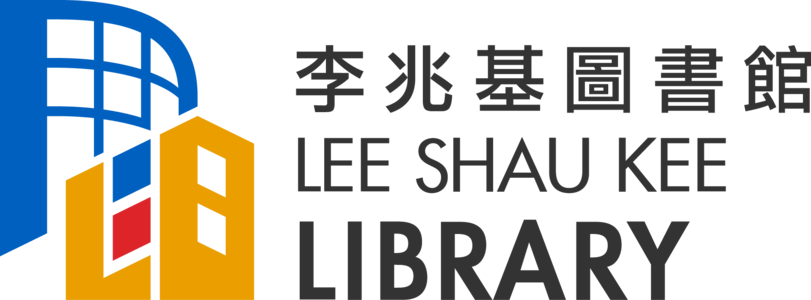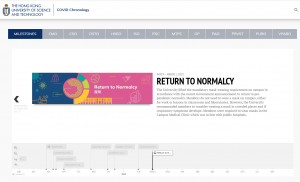
Issue No. 136
April 2025
Preserving the Digital Past: Archiving HKUST’s COVID-19 Memory
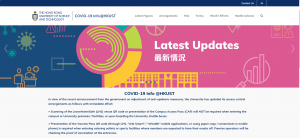 Several months ago, HSEO colleagues contacted the University Archives for help ensuring that important information about HKUST’s response to and handling of the recent pandemic doesn’t just vanish into the digital ether. We’re excited to share highlights from our recent project to archive HKUST’s COVID-19 resources.
Several months ago, HSEO colleagues contacted the University Archives for help ensuring that important information about HKUST’s response to and handling of the recent pandemic doesn’t just vanish into the digital ether. We’re excited to share highlights from our recent project to archive HKUST’s COVID-19 resources.
It has been a complex digital preservation journey. We encountered hurdles including locating relevant documents buried on external sites and repairing broken links on current websites. We partnered with HSEO, GECO, and ITSO to overcome these issues.
We successfully archived two snapshots of the COVID-19 Info @ HKUST website, from December 18, 2022 and March 1, 2023. You can explore them through the Digital University Archives:
- March 2023 Version (https://archives.hkust.edu.hk/items/94e10b90-05ba-4abf-987a-db581dc8ed51)
- December 2022 Version (https://archives.hkust.edu.hk/items/cc8e2fe0-0a6d-4450-83a2-ac7bccf90d84)
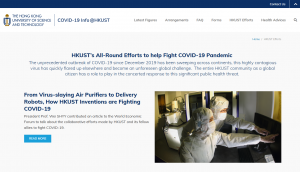 We also archived the COVID-19 Chronology website, with a whopping 1,148 PDFs, Word docs, Excel sheets, and videos! This captures timelines and events that showcase how the University adapted and navigated the crisis and provides a reference for future pandemic preparedness.
We also archived the COVID-19 Chronology website, with a whopping 1,148 PDFs, Word docs, Excel sheets, and videos! This captures timelines and events that showcase how the University adapted and navigated the crisis and provides a reference for future pandemic preparedness.
The Digital University Archives includes university publications, newsletters, early images of HKUST, and more. You can explore it at https://archives.hkust.edu.hk!
Collection Spotlight: Gale Primary Sources – Chinese History Treasure Trove
You are familiar with books and journals. Primary sources such as letters, diaries, government documents, memorandums, minutes of meetings, or newspapers can also be fertile fields for research. For Chinese, Hong Kong, and world history at large, don’t miss our extraordinarily rich collection of Gale Primary Sources (GPS). From the Library home page, choose the Databases tab and type in “Gale.” You will see a broad spectrum of digital archives back to 1450.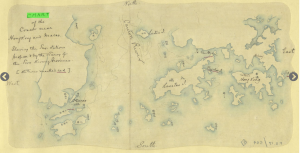
The China and the Modern World series are most popular. For example, Imperial China and the West (1815-1905) has over 1,770 files and more than one million pages of text. These files were sent between the UK Foreign Office in London and British institutions in China. They cover a period which was particularly dense with significant events in Sino-British relations, including the Opium Wars, Taiping Rebellion, and Boxer Uprising.
Piracy was rampant around the South China coast in those days. The files on “Piracy in China Seas” reveal a little-known naval arm called stinkpots. They were clay pots filled with things like firecrackers, black powder, nails, and sulphur. After ignition, pirates tossed them onto the deck of their target, creating fire, flying debris, and smoke with a suffocating smell. In the commotion, pirates seized and raided the victim vessel for its valuable merchandise.
Comparing stinkpots with hand grenades will lead to new findings. Whatever your interests in Chinese and Hong Kong history, turn to Gale Primary Sources.
Student Collaboration: Work, Earn and Learn in DS CoLab
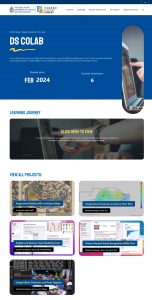 Develop your practical skills and engage in meaningful projects with DS CoLab! https://library.hkust.edu.hk/ds/ds-colab/.
Develop your practical skills and engage in meaningful projects with DS CoLab! https://library.hkust.edu.hk/ds/ds-colab/.
Every Fall and Spring, UG students join our DS CoLab projects as part-time student helpers. They work with a dedicated team exploring state-of-the-art technologies while applying their skills through hands-on projects. They benefit from mentorship by library staff and self-directed exploration of various tools. This experience can arm you with practical digital skills increasingly valued in today’s world.
The source code of every DS CoLab project will be open-sourced on our GitHub. Your hard work and the effort you put in will be visible to the public. We hope this approach can inspire fellow students and scholars to explore similar initiatives and contribute to the growing DS community, fostering an open and collaborative sharing culture.
An exciting aspect of DS CoLab is that our library team actively seeks opportunities for students to showcase their work – at events like international webinars, conferences, and talks. There is also the possibility of co-authoring papers based on the DS CoLab projects. Students can present their work to a broader audience, gaining valuable feedback and recognition and enhancing their academic portfolio. In our most recent project completed in Fall 2024, an English and Chinese Topic Modeling Tool was developed by our two student helpers Sherry and Yolanda – and they will be presenting it at the Global Digital Humanities Symposium 2025 on April 4, organized by Michigan State University!
Watch our job vacancy page, where we recruit students before the start of each term. And if you have any project ideas, we’d love to hear from you too! We’re open to innovative suggestions and discussions. Join us as a student helper where you can earn money while learning and developing practical skills through real-world projects. Let’s Work, Earn, and Learn in DS CoLab!
E-Discovery Week – A Great Success
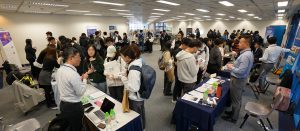 The Library hosted our 6th E-Discovery Week from February 17 to 21, achieving a remarkable milestone with the highest number of participants ever – over 2,000 students and staff! The event featured a variety of interactive activities designed to raise awareness and usage of the Library’s quality e-resources, complete with quizzes to keep everyone engaged and learning.
The Library hosted our 6th E-Discovery Week from February 17 to 21, achieving a remarkable milestone with the highest number of participants ever – over 2,000 students and staff! The event featured a variety of interactive activities designed to raise awareness and usage of the Library’s quality e-resources, complete with quizzes to keep everyone engaged and learning.
The Week kicked off with an Online Challenge that tested participants’ database searching skills while offering a fun way to explore the Library’s extensive e-resources. Those completing the quiz received two entries into the Grand Lucky Draw.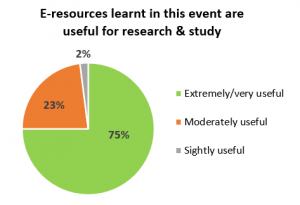
In addition, we held 11 engaging Zoom workshops, conducted by trainers from various vendors and our Subject Librarians. Each workshop ended with a short quiz, providing participants with more lucky draw chances.
The most exciting highlight was our new stamp collection game during the 2-day exhibition in the Library Gallery. Participants explored booths hosted by 10 leading database providers and the Library, discovering an array of subscribed databases, answering one-minute quizzes, and collecting stamps to earn up to 9 lucky draw chances. This engaging game fostered valuable interactions and learning opportunities between users and exhibitors.
Here’s some feedback from exhibitors:
• The stamp card system was really great. It motivated students to visit each booth and helped us track booth traffic.
• I think it is great overall! Just think I need one more colleague to help with the huge demands! 🙂
• Students and scholars from various faculties showed interest in digital archive collections, especially regarding the History of HK/China and famous newspapers archives. Very encouraging scenes. And for sure, the number of participants is just out of the world!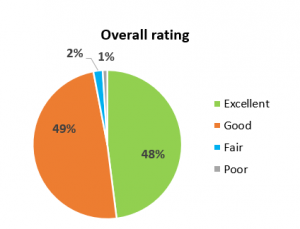
A post-event survey of participants also indicated very positive feedback. They found the E-Discovery Week activities highly engaging and useful.
A heartfelt thank you to all participants for making E-Discovery Week 2025 a great success, and to our sponsors for their generous support! On March 12, we celebrated with a prize presentation ceremony in the Library’s IC Learning Space. Congratulations to all our prize winners! For snapshots of E-Discovery Week, visit: https://library.hkust.edu.hk/about-us/user-engagement/2025-e-discovery/.
iTalks – Prof. Low and Dr. Ullah
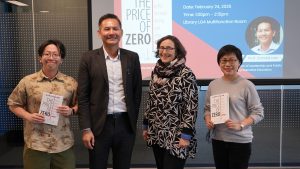 In his February 24 talk, Prof. Donald Low analyzed the slow recovery of the Chinese economy post- COVID, highlighting the unexpected challenges that emerged after pandemic restrictions were lifted in late 2022. Drawing from his book The Price of Zero: China’s Policy Missteps During & After COVID, Prof. Low explored whether China’s economic slowdown is structural or cyclical and discussed its potential repercussions for Asia and the global economy.
In his February 24 talk, Prof. Donald Low analyzed the slow recovery of the Chinese economy post- COVID, highlighting the unexpected challenges that emerged after pandemic restrictions were lifted in late 2022. Drawing from his book The Price of Zero: China’s Policy Missteps During & After COVID, Prof. Low explored whether China’s economic slowdown is structural or cyclical and discussed its potential repercussions for Asia and the global economy.
Participants found the discussion relevant and praised Prof. Low’s clear presentation and structured analysis. They felt “he backed up his points with solid facts and data.”
Other feedback included:
• The talk opened up many fresh thoughts for me.
• The view point of China’s future economy is so special and valuable, hope there is more time for the writer to share more.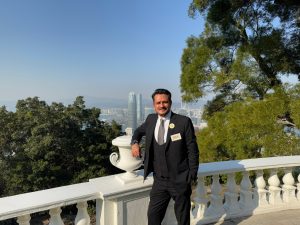
On March 27, Dr. Rizwan Ullah spoke on “My Narrative @852,” sharing personal photographs from his upbringing in Hong Kong. He explored themes of diversity, inclusiveness, and openness, reflecting on how these experiences shaped his perspectives and celebrating the richness of cultural diversity in Hong Kong.
Dr. Ullah, a Vice Principal with over 20 years of experience in education, focuses on the needs of Non-ethnic Chinese (NEC) students. He holds a PhD from the University of Hong Kong and is actively involved in research on multicultural education. For contributions to youth development and community service, he received a Medal of Honor in 2021 and a Chief Executive Commendation Award in 2015.
Enhancing Library Services Through User Experience (UX) Training
At HKUST Library, we continuously seek ways to enhance your experience and ensure our spaces, services, and resources are intuitive and user-friendly. To better understand your needs, we recently invested in specialized User Experience (UX) training for our staff.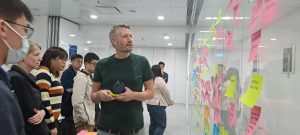
In January we collaborated with other JULAC libraries to bring UX expert Andy Priestner to Hong Kong for an intensive training program. Andy is a globally recognized expert in UX research and design, with a strong focus on libraries and higher education. He has worked extensively with academic and public libraries worldwide – in the US, UK, Australia, and across Europe.
Twelve Library staff participated in hands-on workshops, covering focus groups, guerrilla interviews, behavioral mapping, observation, user-centered surveys, and other techniques. These methods will help us gather valuable insight directly from our students and faculty, enabling us to refine services and design user-centric improvements.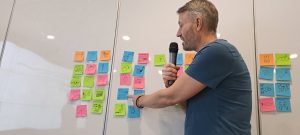
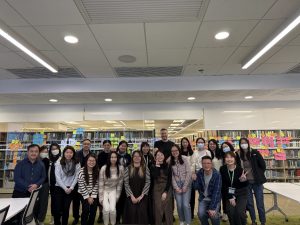 A recent use case was our student engagement survey on curved vs. flat monitors. Using a simple approach, we invited students to vote for their preferred option by placing a sticker under their choice in situ. This interactive and visual method allowed us to collect real-time feedback to make an informed decisions about the technology and equipment provided. User driven insights like these ensure our services align with actual needs rather than assumptions.
A recent use case was our student engagement survey on curved vs. flat monitors. Using a simple approach, we invited students to vote for their preferred option by placing a sticker under their choice in situ. This interactive and visual method allowed us to collect real-time feedback to make an informed decisions about the technology and equipment provided. User driven insights like these ensure our services align with actual needs rather than assumptions.
With many new Library staff due to turnover and retirements, this training was also a valuable opportunity to maintain a strong service mindset. It ensures our team is well-equipped to provide user-centered support, reinforcing our commitment to continuous improvement. The program also provided an excellent platform for exchanging ideas with peer libraries, enriching our collective expertise.
By embracing UX best practices, we reaffirm our commitment to making the Library a dynamic and responsive space that evolves with your needs. Stay tuned for more UX initiatives—we look forward to your input!
Honouring Our Student Helpers
On March 17, we hosted a special Helper Appreciation Party to honor the invaluable contributions of our student helpers. This event recognized their hard work and dedication, and we proudly presented the Outstanding Student Helper Award to ten exemplary students:
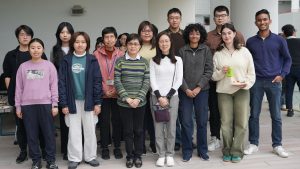
- CHEUNG Chi Kwan, Luke (PHYS)
- CHOI Tsz Yan, Ruby (MATH)
- CHUNG Tsz Yan, Giann (CSE)
- HUI Ka Shun, Karson (ISOM)
- LOU Cheuk Yin, Jessie (DSCT)
- TO Natalie (CIVL)
- WANG Yuning (CSE)
- YIP Ching Yi, Delores (IEDA)
- YIP Sau Lai (DSCT)
- YUE Jia Ning (ISOM)
Self-service Lockers on LG1
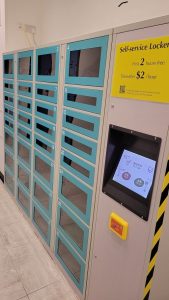 Just a friendly reminder that our library lockers are here for you! If you haven’t tried them yet, now’s the perfect time!
Just a friendly reminder that our library lockers are here for you! If you haven’t tried them yet, now’s the perfect time!
Why use our lockers?
• Safe & Secure: Keep your personal items safe while you leave the seat for a short while.
• Convenient: Easily accessible in the LC.
• Free for the first two hours: Reserve at no cost!
Visit our Self-service Locker page https://library.hkust.edu.hk/services/facilities/lockers/ for details.
Don’t miss out on this great service. Your belongings deserve a safe spot while you dive into your academic adventures!
Systems Update – Testing Electronic ID for Library Access
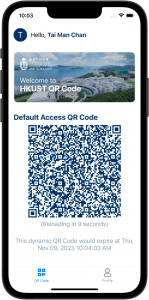 This spring, the Library will add one of ITSO’s new smart ID access panels to the ground floor entry gates. Once the problems are worked out, the trial will expand and eventually become the new and more secure way for you to enter the Library.
This spring, the Library will add one of ITSO’s new smart ID access panels to the ground floor entry gates. Once the problems are worked out, the trial will expand and eventually become the new and more secure way for you to enter the Library.
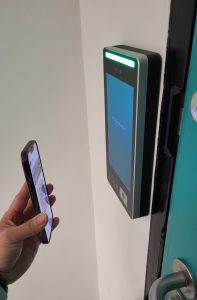 The HKUST electronic identity system is designed for everyone associated with HKUST, providing access to various university services securely and conveniently. More information can be found at https://itso.hkust.edu.hk/services/general-it-services/e-identity.
The HKUST electronic identity system is designed for everyone associated with HKUST, providing access to various university services securely and conveniently. More information can be found at https://itso.hkust.edu.hk/services/general-it-services/e-identity.
The new e-identity system leverages dynamic QR code technology, mostly through HKUST mobile apps for students and staff. It is currently used as an option for access to school buses, sports facilities, and many offices and other doors throughout the academic building. In addition to providing a secure digital alternative to using the physical HKUST ID card, the e-identity system can support visitor access via one-time QR codes.
Initially, we will be adding the new smart access panel to one of the gates on G/F and evaluating it through online monitoring and user observation. If successful, we will expand the trial to the other gates on G/F, LG1, and LG5. Throughout these trials, the option of just tapping your HKUST card on the existing reader will still be available.
Once installed, please try it out and let us know how well or poorly it works for you.
last modified 02 April 2025

